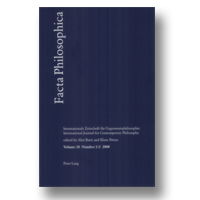|
5.
|
Facta Philosophica:
Volume >
7 >
Issue: 1
Clotilde Calabi, Alberto Voltolini
Should Pride of Place be Given to the Norms? Intentionality and Normativity
abstract |
view |
rights & permissions
| cited by
Reasons motivate our intentions and thus our actions, justify our beliefs, ground our hopes and connect our feelings of shame and pride to our thoughts. Given that intentions, beliefs and emotions are intentional states, intentionality is strongly connected with normativity. Yet what is more precisely their relationship? Some philosophers, notably Brandom and McDowell, contend at places that intentionality is intrinsically normative. In this paper, we discuss Brandom and McDowell’s thesis and the arguments they provide for its defence. In contrast to what they hold, we argue that neither reference intentionality nor content intentionality are intrinsically normative, although at least content intentionality has normative implications. More precisely, we argue that neither species of intentionality are normative from a semantical viewpoint, because being in an intentional state is not being in a state that is semantically correct or incorrect. Nevertheless, being in a state endowed with content may be a reason for believing or acting. Thus, we argue that content intentionality has normative implications. More precisely, we argue that any content is such that, if it is the content of a state that is sensitive to reasons—as judging paradigmatically is—then it entitles the subject of that state to have further states or to act in certain ways.
|
|
